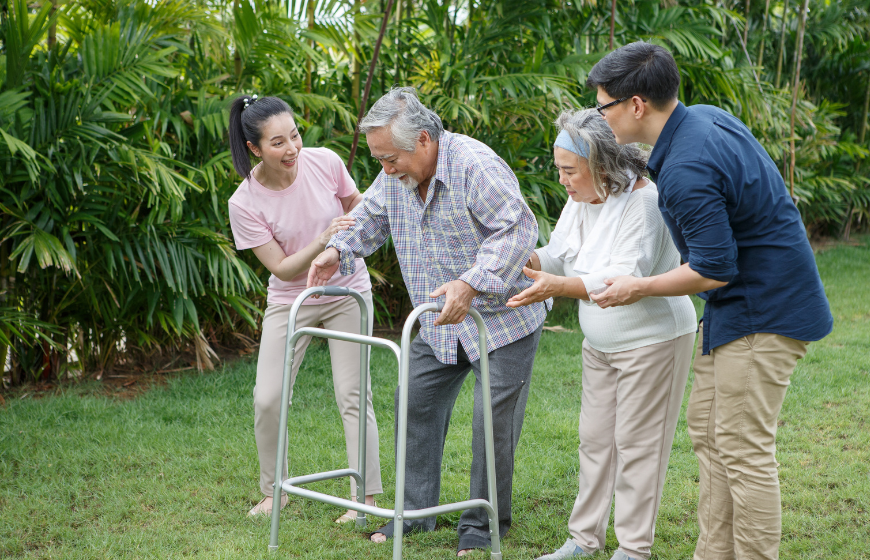If you’re caring for a loved one who has a chronic condition, is recovering from surgery, or who has medically advanced needs, you know that caregiving is a full-time job. Whether you’re coordinating with a home health care RN or home health aide, assisting with medications, or simply being the comforting presence by their side, it’s easy to put your loved one’s needs ahead and leave your own needs last on your to-do list.
But here’s the thing: your needs matter. In fact, the more you care for yourself, the better care you’ll be able to provide. Let’s talk about real, practical caregiver’s self-care strategies designed for caregivers like you. These aren’t just feel-good ideas; they’re crucial for your overall wellness and sustainability.
#1: Schedule Breaks Like You Schedule Appointments
You wouldn’t miss a doctor’s appointment for your loved one, right? So why skip your own moments to rest? Even if it’s just 15 minutes to step outside, sip tea, or read something that has nothing to do with caregiving, build several of those breaks into your day.
Take it a step further by creating a break calendar with color-coded time blocks. Better yet, bring in respite services from a trusted home care agency. At Alliance Homecare, we offer services from a trusted home nurse or home health aide to step in and provide care, giving you peace of mind to recharge.
#2: Move Your Body (Even a Little)
You don’t need a full workout routine to feel the benefits of movement. Gentle stretching while your loved one naps, a short walk around the block, or even dancing in your kitchen to your favorite playlist can lift your spirits and reduce stress.
Many caregivers forget how powerful physical activity is for mood regulation. Try to find 10-20 minutes each day to move in a way that feels joyful. If leaving the house isn’t possible, there are great videos online for chair yoga and low-impact exercises—some even designed specifically for caregivers.
#3: Practice Simple Relaxation Techniques
Relaxation doesn’t require a spa day (though we fully support one if you can swing it!). You can bring moments of calm into your everyday routine with simple, effective techniques like:
- Box breathing: Inhale for 4 counts, hold for 4, exhale for 4, hold for 4. Repeat.
- Progressive muscle relaxation: Tense and release each muscle group, starting from your toes and working up.
- Guided imagery and meditation: Try apps like Calm, Headspace, or Insight Timer for quick resets. Some offer free activities.
These practices are especially helpful before bed to ease anxious thoughts and prepare for restorative sleep.
#4: Set Boundaries Without Guilt
One of the hardest (but most empowering) things to do as a caregiver is to say “no” or “not right now.” Boundaries don’t mean you care less; they mean you’re protecting your energy to care better.
Be clear with friends, family, and even healthcare providers about your limits. Don’t overcommit. And if someone offers to help, say yes. That could look like them running errands for you, picking up groceries, or spending an afternoon with your loved one so you can rest. Remember that caregiving is never meant to be a solo act.
#5: Eat Like You Want to Feel Better
Nutrition often slips down the priority list, especially when you’re focused on someone else’s needs. But keeping your blood sugar steady and staying hydrated can make a huge difference in how you feel.
Try these caregiver-friendly nutrition tips:
- Keep snacks like nuts, chopped fruit, or protein bars on hand.
- Prep simple meals in batches. Think soups, grain bowls, or casseroles.
- Don’t skip meals—even if that means eating a PB&J while your loved one rests.
And of course drink lots of water. You can’t run on empty.
#6: Get Enough Sleep (Even If It’s Not Perfect)
Sleep may feel like a luxury, especially if you’re waking up throughout the night to tend to your loved one. But even small changes in a caregiver’s self-care routine can improve sleep quality.
- Limit caffeine after 2pm.
- Create a bedtime routine.
- Use white noise or calming music to help you fall asleep faster.
- If possible, arrange for an at home nurse to support overnight care. A home health care RN can ensure you get nights of uninterrupted sleep.
Sleep affects everything: your mood, your immune system, your memory. Make it a priority wherever and however you can.
#7: Explore Mindfulness to Stay Grounded
Caregiving can feel like living in the past (grieving what’s changed) and the future (worrying about what’s ahead) at the same time. Mindfulness helps you come back to the now.
Try this: each day, pause to notice 5 things you can see, 4 you can touch, 3 you can hear, 2 you can smell, and 1 you can taste. This simple sensory check-in can center you and calm your mind as it races.
Mindfulness doesn’t erase the hard parts. But it does help you face them with more presence and patience.
You’re Supported and Seen and Never Alone
Your to-do list is long. Providing daily support, coordinating home nursing services, juggling appointments, and still finding time for your own personal care is challenging. Your dedication is noticed and extraordinary.
But you don’t have to tackle that list alone.
At Alliance Homecare, we understand what family caregivers go through. Our home care services are designed not just to support those receiving care but also to support and uplift those loved ones who help provide it. From skilled nursing to companion care and respite options, we’re here to help you breathe easier.
Remember: caregiver’s self-care is not a luxury; it’s a lifeline. You deserve support, too. Reach out to us so we can help you navigate your caregiving journey.




